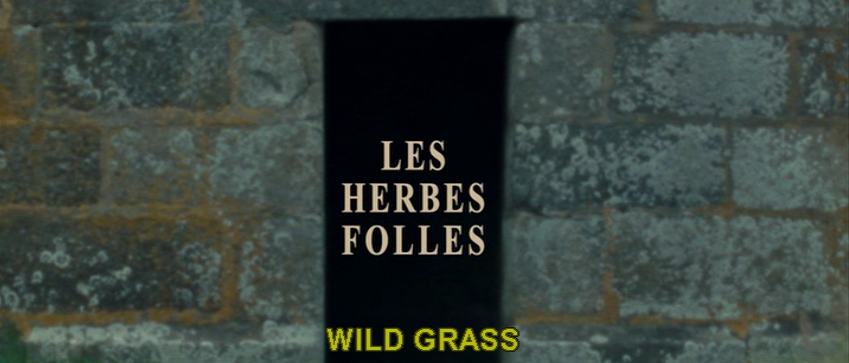
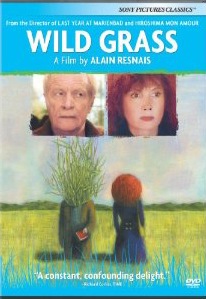 BUY FROM AMAZON: CLICK HERE!
BUY FROM AMAZON: CLICK HERE!
STUDIO: Sony Pictures Classics
MSRP: $28.95
RATED: PG
RUNNING TIME: 104 minutes
SPECIAL FEATURES:
• Theatrical Trailer
• Previews
• Portrait of Production Designer Jacques Saulnier
The Pitch
It’s like Amelie, but instead of a quirky chick, it’s a middle-aged French sociopath who may be a convicted murderer.
The Humans
Starring Sabine Azema, Andre Dussollier, Anne Consigny, Emmanuelle Devos, Mathieu Amalric, Michel Vuillermoz, Edouard Baer
Written by Alex Reval, Laurent Herbiet
Directed by Alain Resnais
The Nutshell
When dentist/pilot Margarite Muir (Azema) has her purse stolen while shopping, she attracts the attention of a random suitor, Georges Palet (Dussollier). He finds her discarded wallet in the parking lot of the shopping mall and is immediately intrigued by her odd photos and interest in aviation, which he shares, too. This leads to Georges stalking Margarite in order to convince her that she loves him until the tables turn. Oh, and it’s mainly a light, quirky comedy.
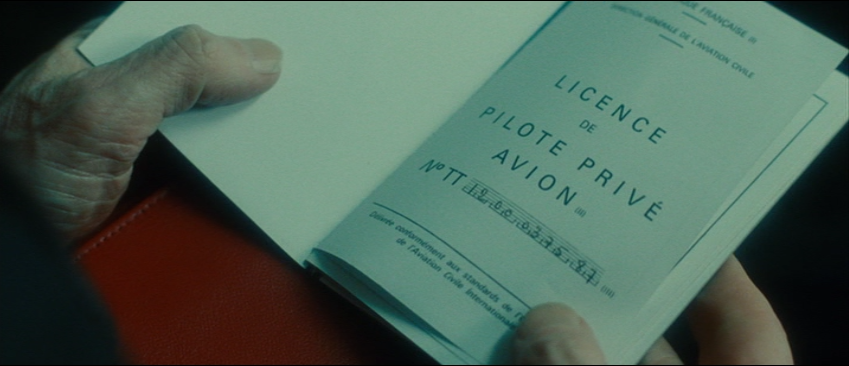
My French is a bit rusty, but I’m pretty sure this is a Multipass.
The Lowdown
There are endings that leave us wondering, long after the final frame has faded to black, because they have not wrapped up all the questions in the movie for us in a neat little bow. And then there are endings like in Wild Grass, which I could reveal here and now and it would reveal nothing about everything that happens before it. It feels so completely unrelated. In fact, as the credits rolled, I couldn’t imagine a less relevant line on which to end this movie, given all of the different narrative threads introduced throughout the film – many that were quite interesting and engrossing. Though as it rolls around in your brain for a bit, it starts to reveal itself: the sign of a superbly crafted film.
The finale came out of left field, but it wasn’t completely surprising. Around an hour into the movie, things started to go from quirky-odd to altogether surreal. For much of the remaining running time, director Alain Resnais’ intriguing choices to end scenes on cliffhangers (always good to get out of a scene as soon as possible, but these felt like we were leaving the characters in the midst of the action), the use of an unreliable, unnamed narrator along with internal narration from multiple characters, and extremely expressive music and camera movements all lent to creating a rather fantastical tale, during which it was difficult to figure out what we were supposed to make of it all.
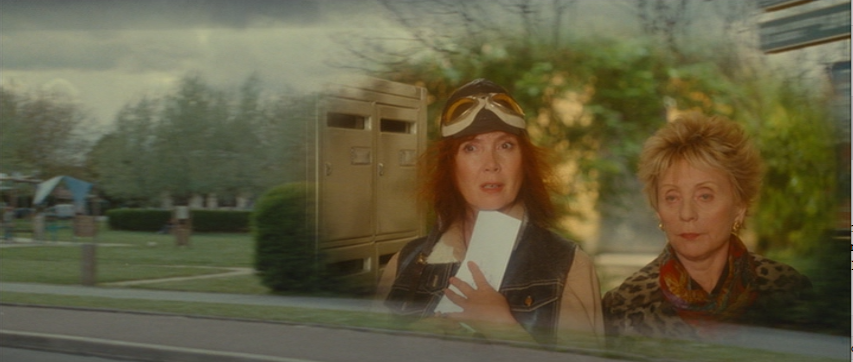
A2: Earhart Goes to France
At first a movie about obsession, it follows the lives of two strangers: Margarite, an older, single woman who has her purse stolen while out shopping; and, Georges, a 50-something convicted-and-now-free murderer(?) who lives with his wife(?) and is an aviation fan. (Many backstory elements are alluded to but not quite developed.) When Georges happens upon Margarite’s stolen-now-discarded wallet, he sees that she is a pilot and immediately likes her despite her less-than-flattering photos on her IDs. It’s almost a dark comedy-version of Amelie where instead of an adorable French woman messing with peoples lives to help teach them a lesson on how to live, we have this paranoid, possibly bipolar French man with a strained relationship with his kids – and a romance-less marriage with his wife – who basically demands that he be a part of a stranger’s life.
And then it goes off the rails. Despite his increasingly bizarre and behavior that in another movie could’ve played out like a middle-aged version of Fear, somehow the tables turn without much fanfare and Margarite actually can’t get Georges out of her head even though he says he wants nothing to do with her anymore. Now, given the expressionistic tone of the film and the unreliable narrator (we never find out who it is that is telling this story, what relation he has with the characters, how he knows about the tale, or even if any of this “happened”), it sort of makes sense within this universe. In the opening scene, the narrator talks about how the following stemmed from one incident, a mundane almost insignificant incident – the film itself is based on a novel called L’Incident – and how even those types of events can lead to altogether bizarre and complex situations. So, for things to end up getting like that, we’re not completely blindsided.
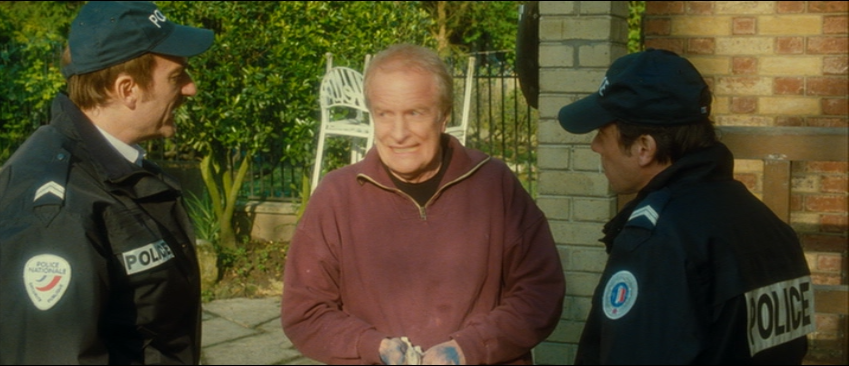
“Oh, that dead body buried in my backyard underneath the rose bushes? No, I don’t know a thing about that.”
Still. The relationships developed between Georges and his wife and – okay, his wife, let’s start there. I’m not even convinced she was his wife given that they were never romantic. At first I thought she was his daughter given how old he looks compared to her. And then I thought maybe his sister. Then there’s another option: it’s entirely possible that she never existed since we almost always see her in the exact same outfit day after day after day. Also, why would a wife be so casual and unaffected by her ex-con husband’s bizarre relationship with a strange woman whose wallet he found randomly: Margarite calls the house late at night multiple times waking up the wife in the process and then even stops by his house where the wife offers her tea.
Throw in Josepha, Margarite’s best friend/fellow dentist, and you have an altogether odd foursome. Not nearly as odd as the denouement, though.
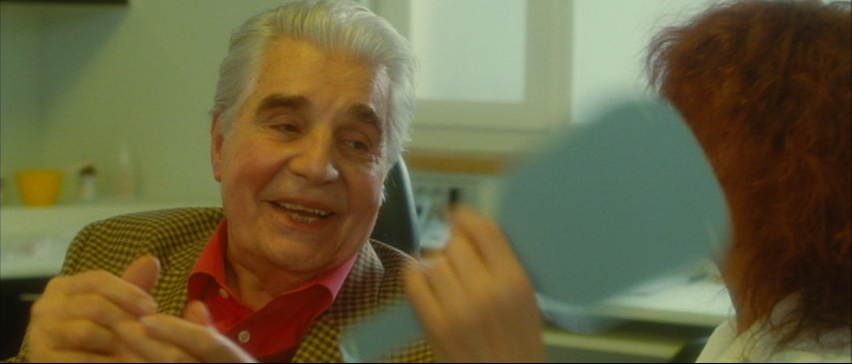
Folks, this grill is after hours of dental work.
And had the proceedings not been as thoroughly entertaining, I may have been angry at the film; but it’s hard when everything was so masterfully done. At nearly 90 years old, Resnais is a bona fide master of his craft. Seriously, this guy knows how to manipulate the medium to completely toy with the viewer. While some movies’ tones are all over the place because the director and the actors were on completely different levels due to incompetence, Resnais’ Wild Grass shifts throughout: at moments thriller at others dark comedy at others psychological drama and parts sex farce — all with the music and camera playing integral parts at achieving these changes effectively. His camera glides through the air expertly, confidently casting its eye on interesting compositions and familiar scenes but with unique choices; we never see Margarite’s face in the beginning of the film, lending an air of mystery off the bat. I’d almost consider his camera another character in the film, practically emoting along with the rest of the performers. During the brief scene with Georges and his entire family – wife, daughter and her husband, and son – at dinner we can tell there’s tension between them all through their dialogue, but also because the camera all of a sudden gets shakier in its movements and watches most everything from afar, making us feel the awkwardness and distance between the characters.
That subjective quality of the film allows for the ending that Resnais chooses, one that on the surface feels completely out of left field, though ends up feeling like a mirror of the opening scene. Another random occurrence, a mundane event that sets in motion more complex scenarios, this time though ones that we won’t see. Instead of wrapping everything up, it introduces even more questions and absurdity. It introduces another incident.
It’s not at all what I expected after the opening frames of this strange little film. While some might find this type of open-ended climax infuriating – even myself, depending on the day and time, to be honest – this time around, I’m pleasantly baffled.
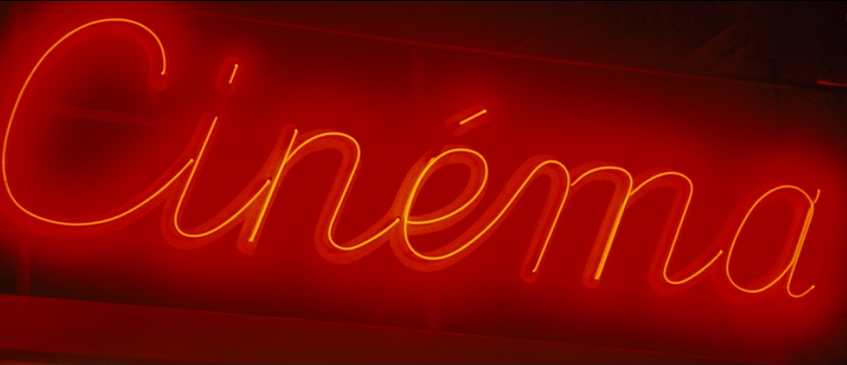
My French is a bit rusty, but I’m pretty sure this says “surrender.”
The Package
A gorgeous film on every level. Shot in 2.35-to-1 aspect ratio, the cinematography matches Resnais’ confident eye for detail and composition, framing and lighting everything with expert ease. The backdrop of Paris surely doesn’t hurt. And I don’t mean the Paris that you get in some Hollywood fare, either, but the Paris that doesn’t involve tourists and the Eiffel Tower. Not much in the way of extras other than the featurette on the production designer.
Rating: 




Out of a Possible 5 Stars
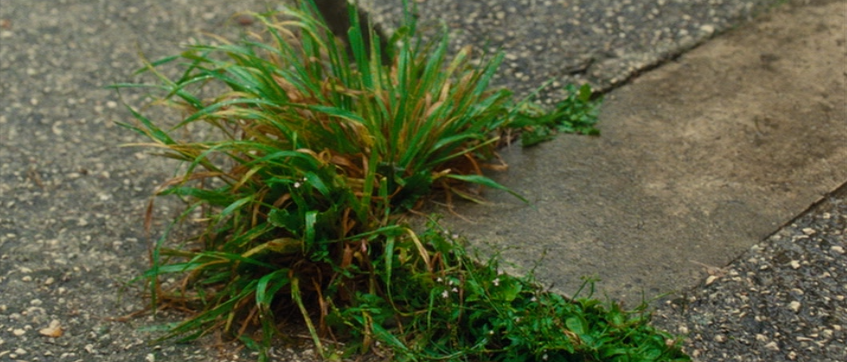
Oooh, it’s a metaphor! If only I knew what that word meant…